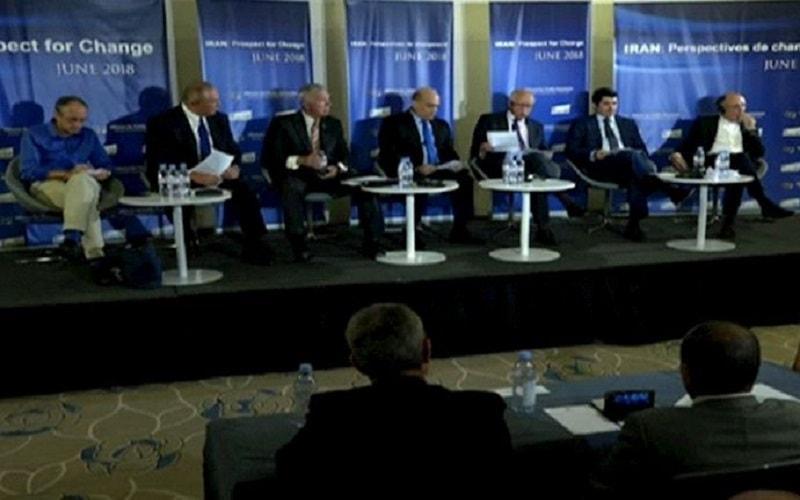Expert panel discusses the threats posed by the
A panel of politicians, military experts and analysts discussed the issue of the Iranian regime’s Revolutionary Guards and the threats posed by the regime to the region and across the world. Walid Phares, an expert on global terrorism and Middle Eastern affairs, who moderated the panel, said, “[The Iranian regime] always had the ambition to control the region.”
And its main implement to achieve this goal has been the Islamic Revolutionary Guards Corps (IRGC), which was founded shortly after the 1979 revolution.
Raid Yassine, Yemeni ambassador in Paris and former Foreign Minister of Yemen said, “If we want to understand why Iran intervenes in other countries, it’s written in their constitution. It shouldn’t be ignored in the future. They will continue whatever happens.”
Yassine iterated a list of aggressions by the Iranian regime in his country, including its export of arms and ammunition to the Houthis and the presence of its IRGC forces in the country and reminded the panel that the UN found the Iranian regime in violation of an arms embargo.
“We have been receiving aid and support from Saudi Arabia, Egypt, Emirates, Oman and other countries, Yassine said. “We did not receive any support from Iran. Instead, we discovered spy networks.”
General Charles Wald former Deputy Commander of U.S. European Command, reminded the audience that the Iran deal did not moderate the Iranian regime’s behavior. “The JCPOA was pretty much a failure,” he says, adding that “Tehran believes its security resides in exporting its revolution.”
Wald then listed various facts of the Iranian regime’s violent intervention in the region in the past years, especially in Iraq and Syria.
Wald also stressed that the Iranian people have proven that they do not support the regime’s meddling in the region, which became evident in recent protests. “Protesters’ grievances continued to include the regime’s support for Hezbollah and intervention in other countries,” he said.
“We’ve used the term meddling for years regarding the IRGC. Today I see their activities as interdiction, subversion, and takeover of Middle East governments,” said General James Conway (Ret.), former Commandant of the U.S. Marine Corps.
Conway also gave details of the Iranian regime’s meddling in Middle Eastern countries, including the thousands of troops it has dispatched to these countries and the billions of dollars it spends on maintaining its influence in those countries.
“It is hard to find a conflict or a suffering people in the Middle East that the IRGC criminals do not touch,” Conway said.
Conway also noted that the IRGC is finding it increasingly difficult to find support for its foreign ventures inside Iran, where the population is tired of the expenditures and casualties in foreign wars.
Frédéric Encel, writer and scholar of geopolitics specialized on the Middle East, said, “Terrorism and sectarianism are the elements through which the Iranian regime is breathing.”
Encel made distinct recommendations for confronting the threats of the Iranian regime and the IRGC. First is a legal confrontation. “We have to raise legal issues, especially about IRGC,” Encel said.
Second is the economic confrontation. “IRGC has many front companies,” Encel said, adding that many of those companies are hard to trace to the IRGC. “We need to make an index of the IRGC entities that we can’t do business with.”
Finally, Encel emphasized the need for military confrontation with the regime, not in Iran, but with its troops and proxy groups in the region.
